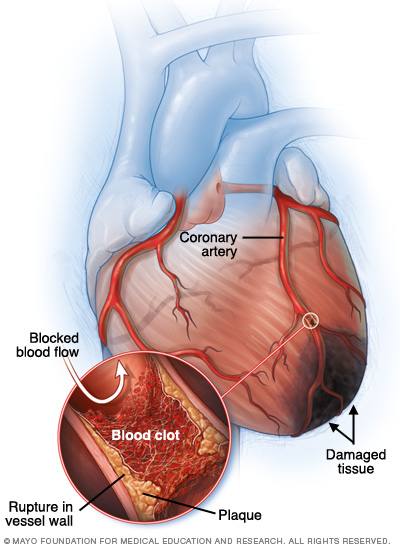- Chest discomfort or pain
This discomfort or pain can feel like a tight ache, pressure, fullness or squeezing in your chest lasting more than a few minutes. Pressure, tightness, pain, or a squeezing or aching sensation in your chest or arms that may spread to your neck, jaw or back. This discomfort may come and go.
- Upper body pain
Pain or discomfort may spread beyond your chest to your shoulders, arms, back, neck, teeth or jaw. You may have upper body pain with no chest discomfort.
- Abdominal and stomach pain
Pain may extend downward into your abdominal area and may feel like heartburn.
- Shortness of breath
You may pant for breath or try to take in deep breaths. This often occurs before you develop chest discomfort, or you may not experience any chest discomfort.
- Heart palpitations
You may feel as if your heart is skipping beats, or you may just be very aware that your heart is beating.
- Anxiety
You may feel a sense of doom or feel as if you're having a panic attack for no apparent reason.
- Fatigue
Feeling more exhausted and tired than usual.
- Lightheaded or sudden dizziness
In addition to chest pressure, you may feel dizzy or feel like you might pass out.
- Cold sweat
You may suddenly break into a sweat with cold, clammy skin.
- Nausea, indigestion or vomiting
You may feel sick to your stomach or vomit.
Don't "tough out" heart attack symptoms for more than five minutes. Call 911 or other emergency medical services for help.
If you don't have access to emergency medical services, have someone drive you to the nearest hospital. Drive yourself only as a last resort, if there are absolutely no other options.
This article is written by Mayo Clinic Staff. Find more health and medical information on mayoclinic.org.
 Most heart attacks begin with subtle symptoms — with only discomfort that often is not described as pain. The chest discomfort may come and go. Don't be tempted to downplay your symptoms or brush them off as indigestion or anxiety.
Most heart attacks begin with subtle symptoms — with only discomfort that often is not described as pain. The chest discomfort may come and go. Don't be tempted to downplay your symptoms or brush them off as indigestion or anxiety. Common heart attack signs and symptoms include:
Common heart attack signs and symptoms include:






